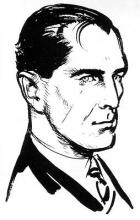Over the years, the iconic character of James Bond has had regular brushes with India. The most recent one was with 2010's Quantum of Solace where Anil Kapoor plays an important supporting role as the eccentric head of a tech company in Bombay. There have been a few others too. But perhaps not one as intriguing as this.
If one questions what makes Bond films so enjoyable, answers might include the coolness of 007's character, all the gadgetry at his command, and, of course, the exotic women. But one of the votes would undoubtedly go to the music which lies at the very heart of the franchise. The Bond theme tune adds the umami that catapults the flavour of Bond from that of a rather clever spy to a cultural icon. However, if it wasn't for a certain twist that pointed fate toward a different direction, things might have been very different.
To understand what happened, we have to flash back to 1961 when a certain Trinidadian named Sir Vidiadhar Surajprasad (V.S.) Naipaul published his first internationally (and, according to some, most) notable book titled, A House for Mr. Biswas. The success of the book immediately led to a musical adaptation set for the stage with music composed by Monty Norman. One of the primary pieces he composed for the play was named Bad Sign, Good Sign. However, the production unfortunately never made it to the stage. Norman, who had also been approached to compose a signature theme for Dr. No, the very first Bond movie, decided to rewrite the aforementioned track from the Naipaul musical for Bond. He added an electric guitar and incorporated a cooler vibe and ended up with one of the most widely recognisable tunes of the modern era.
Were it not for the failure of A House for Mr. Biswas to make it into production, Bond films might have been decidedly different.

